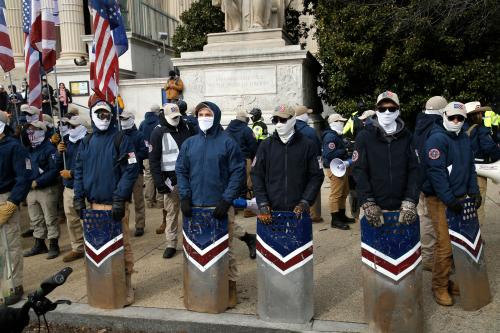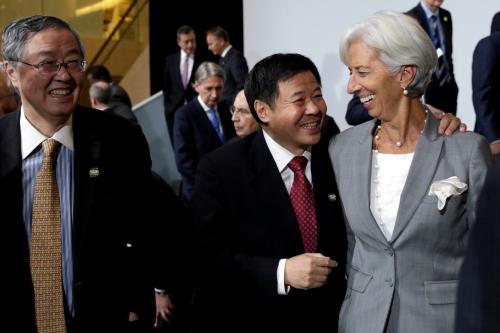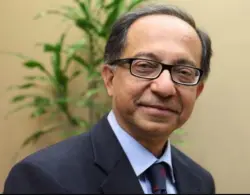This op-ed was originally published by Project Syndicate.
At the end of this year of political trauma and conflict, I found myself feeling an unexpected sense of hope, sitting in Mumbai, where I could see the Arabian Sea stretching westward toward the Gulf of Aden and Africa, as well as the vast Indian subcontinent extending eastward to the Bay of Bengal and the lands beyond.
To be sure, one must not gloss over the ongoing catastrophes of 2018. In Yemen, millions of civilians, including children, are suffering starvation and indiscriminate violence. On the southern border of the United States, refugees fleeing misery and conflict don’t know if they will be met with sanctuary or bolted gates and tear gas. Around the world, hyper-nationalist politicians and egomaniacs are launching trade wars, stoking hatred, and veering toward fascism.
If I feel optimistic, it must be because, over the last month, I have been on the road, and somewhat sheltered from the news, from the U.S. to Mexico, China, and, now, India. Through it all, I have chatted with roadside vendors, students, and strangers in cafés, and when one does this it is impossible not to be struck by how similar people are across the planet. We may not look, dress, or speak the same, but our shared humanity becomes evident through conversation and interaction. At a time when hatred of the “other” is on the rise, this is comforting.
Travel also reminds us of our shared history. Walking in Mexico City’s Roma Norte area, amid the old colonial homes with wrought-iron balconies and murals of Alfred Hitchcock, Sigmund Freud, and others, I came across a sign reading “M.N. Roy.” It was a nightclub named after the Indian revolutionary M.N. Roy, who lived in Mexico with his American wife, the social activist Evelyn Trent, in the early twentieth century.
Mexico was then a hub of intellectuals, artists, and radicals with bohemian visions of a new world. Though Roy was born in Arbelia, a tiny hamlet outside of Kolkata, he was a restless soul with phenomenal intellectual powers, who lived all over the world, writing, and speaking. He was one of the founders of the Communist Party of Mexico. Later in life he changed his mind, becoming a radical humanist. I was keen to find out more about the nightclub, but it keeps rather revolutionary hours, opening at 23:15 and closing at four in the morning.
From Mexico, I traveled to the other side of the world, where I addressed a congress in Xiamen, in China’s Fujian Province. I was anxious, having recently heard the story about an American economist who doubted that a joke he was about to relate in a public lecture would survive translation. He was delighted when the audience roared with laughter. At dinner he learned that the joke had been translated as: “The American economist is telling a joke. Please laugh.”
Fortunately for me, no translation was needed, because all lectures at Xiamen University are now delivered in English. I was being hosted by the new, pragmatic China, where English is adopted not for its own sake, but to position China as a global power. While the U.S. under President Donald Trump retreats behind an unbuilt wall, China’s pragmatism is propelling it forward.
From my hotel window in Xiamen, I could see the “piano island,” Gulangyu, a beautiful, pedestrian-only space that serves as a cultural melting pot. The name comes from that fact that many Europeans once settled there in large homes with pianos. And, interestingly, law and order was maintained by Sikh policemen from British India.
After Xiamen, I traveled to neighboring Quanzhou, an even older melting pot. It was not only, for a while, the home of Lao Tzu, the founder of Taoism, but also the landing port for Marco Polo.
While on the road, I did encounter some news, and not all of it was bad. In Mexico, I liked the new president, Andrés Manuel López Obrador, and his vision of a more equitable society. There are risks that he will make policy mistakes. But in a world increasingly ruled by mendacity, a leader with good intentions is a welcome addition.
I also found some hope in the growing likelihood that Trump will be ousted from power, and in recent victories over the nationalism and populism of recent years. In India’s regional elections in November and December, ordinary people—including Hindus—soundly rejected the chauvinist Hindutva ideology peddled by nationalist politicians such as Yogi Adityanath. Even one of the most prominent Hindu monastic orders rejected fundamentalism. On Christmas Eve, Swami Suparnananda, a leading figure in the Ramakrishna Mission, stood together with the Catholic Archbishop of Calcutta and reminded people the “great message of Swami Vivekananda that a good Hindu is a good Christian, a good Christian is a good Hindu, a good Musalman is a good Christian.”
Finally, I found hope in reading “Sapiens: A Brief History of Humankind,” the historian Yuval Noah Harari’s 443-page pass at the last 2.5 million years on Earth. I began reading it with skepticism, but soon was hooked. Written with a philosopher’s flair and interspersed with humor, it brought to mind my teenage encounter with Bertrand Russell’s sweeping A History of Western Philosophy. By reminding us that humans occupy a vanishingly small niche in the universe, it achieves what few books do: It puts us in our place.
The Brookings Institution is committed to quality, independence, and impact.
We are supported by a diverse array of funders. In line with our values and policies, each Brookings publication represents the sole views of its author(s).







Commentary
Op-edA thimbleful of optimism for 2019
January 2, 2019